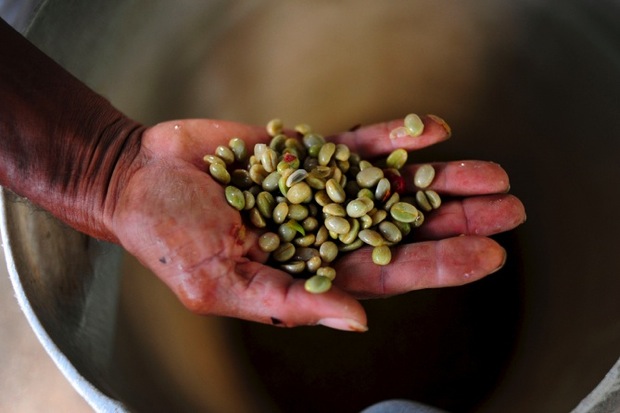by Michael Sheridan of CRS Coffeelands Blog
The impacts of microlots on smallholder farmers has been a topic of discussion on the CRS Coffeelands blog dating back to 2010. The research on the issue to date is largely inconclusive, and powerful critiques of the microlot model have been leveled by influential actors in specialty coffee who question the inclusiveness and impact of the Direct Trade approach. But last week in Nariño, we saw compelling evidence to suggest that microlots can generate positive economic impacts, even for the smallest of smallholder farmers.
For our Borderlands Coffee Project in Colombia, we have recruited six leaders in the U.S. specialty coffee industry to serve on a project Advisory Council. Three of them are pioneers of the direct trade/microlot approach to sourcing coffee: Counter Culture, Intelligentsia and Stumptown.
Last week they all came to visit the project for the first time.
During their visit, advisory council members cupped small lots of coffee from 24 coffee growers selected on the basis of their strong performance last year during the project’s coffee quality baseline survey. Last week, the average score awarded to those coffees was over 84 points. Together the six buyers awarded 21 scores of 86 or higher and four of 88 or more. One roaster awarded a score of 90 points. Sixteen of those 24 coffees were purchased as microlots at prices ranging from 74-327 percent above the local market price; on a day when the price in the nearest town plaza was $0.92, these roasters paid an average price of $1.92.
In my mind, these results validate two of the central convictions of the Borderlands project: (1.) that many of Nariño’s smallholder farmers are already growing coffee that meets the quality standards of the most demanding buyers in the U.S. specialty coffee industry and (2.) they are missing income opportunities because they don’t have enough access to this segment of the market.
The 16 farmers who earned premium prices for their coffee last week made no special investments this year to increase the quality of their coffee. It is the same coffee they have been bringing to the town plaza for years and selling at the prices posted there based on an assessment of its physical quality, with no consideration of cup quality. The only thing that changed this year was that the Borderlands project invested in correcting a market failure; in a place where great coffees are not finding their way to buyers willing to pay growers on the basis of their cup quality, CRS brought talented farmers and willing buyers together to create value for farmers and roasters alike.
While Nariño is an exceptional origin in terms of its growing conditions, the underlying failure of markets to link growers and buyers who share a commitment to quality is not unique to Nariño. As we work over the final 3+ years of the project to increase coffee quality and expand the volumes of quality coffee available to the marketplace, we will collaborate with researchers and industry actors to track the economic returns to smallholder investments in microlots.
TIMELINE and FURTHER READING
- November 2010.
Former Counter Culture Coffee Director Peter Giuliano discusses the potential perils of microlots on this blog with Matt Earley of Just Coffee, a Fair Trade roasting cooperative in Madison.
- May 2011.
Counter Culture commissions research into the social impact of microlots in its supply chain.
- January/February 2012.
Unaware of the Counter Culture initiative, CRS advocates for more research at origin into the returns to smallholder farmers of investments in coffee quality.
- 21 April 2012.
- Counter Culture releases its study The Social Impact of Microlots and presents it to 2012 SCAA Expo audience.
- CRS publishes this interview with Counter Culture Sustainability Manager Kim Elena Ionescu, who directed the study.
- CRS publishes this review of the report, calling for more research into the quantitative impacts of micrlots.
- Summer 2012.
Counter Culture begins working with Colombian exporter Virmax to design a questionnaire that incorporates economic impact questions into its ongoing research into the social impacts of microlots.
- January 2013.
Counter Culture and Virmax begin collecting data from Colombian microlot producers in their supply chain.
- May 2013.
Counter Culture, CRS and CIAT explore expansion of microlot research to include Borderlands Coffee Project participants in Nariño.
- June 2013.
During a visit to the CRS Borderlands Coffee Project, Counter Culture buys its first microlots from Nariño.
Michael Sheridan
Michael Sheridan is the Chief Executive Officer of the Coffee Quality Institute, a nonprofit organization with a mission to improve coffee quality and the lives of those who produce it. Sheridan has been leveraging market forces to make coffee work for smallholder farmers and farm workers since 2004. Most recently he directed progressive green coffee sourcing activities and direct-trade partnerships at Intelligentsia Coffee. Prior to that he worked to deliver initiatives in the coffee sector in Central and South America on behalf of Catholic Relief Services.







Comment